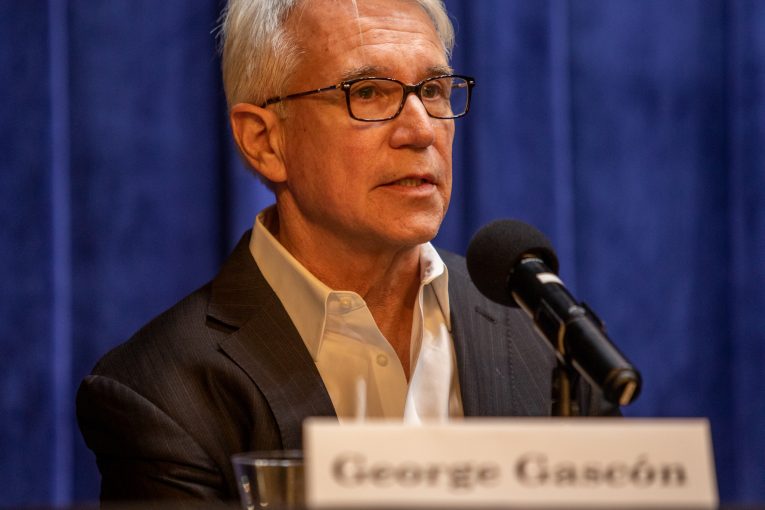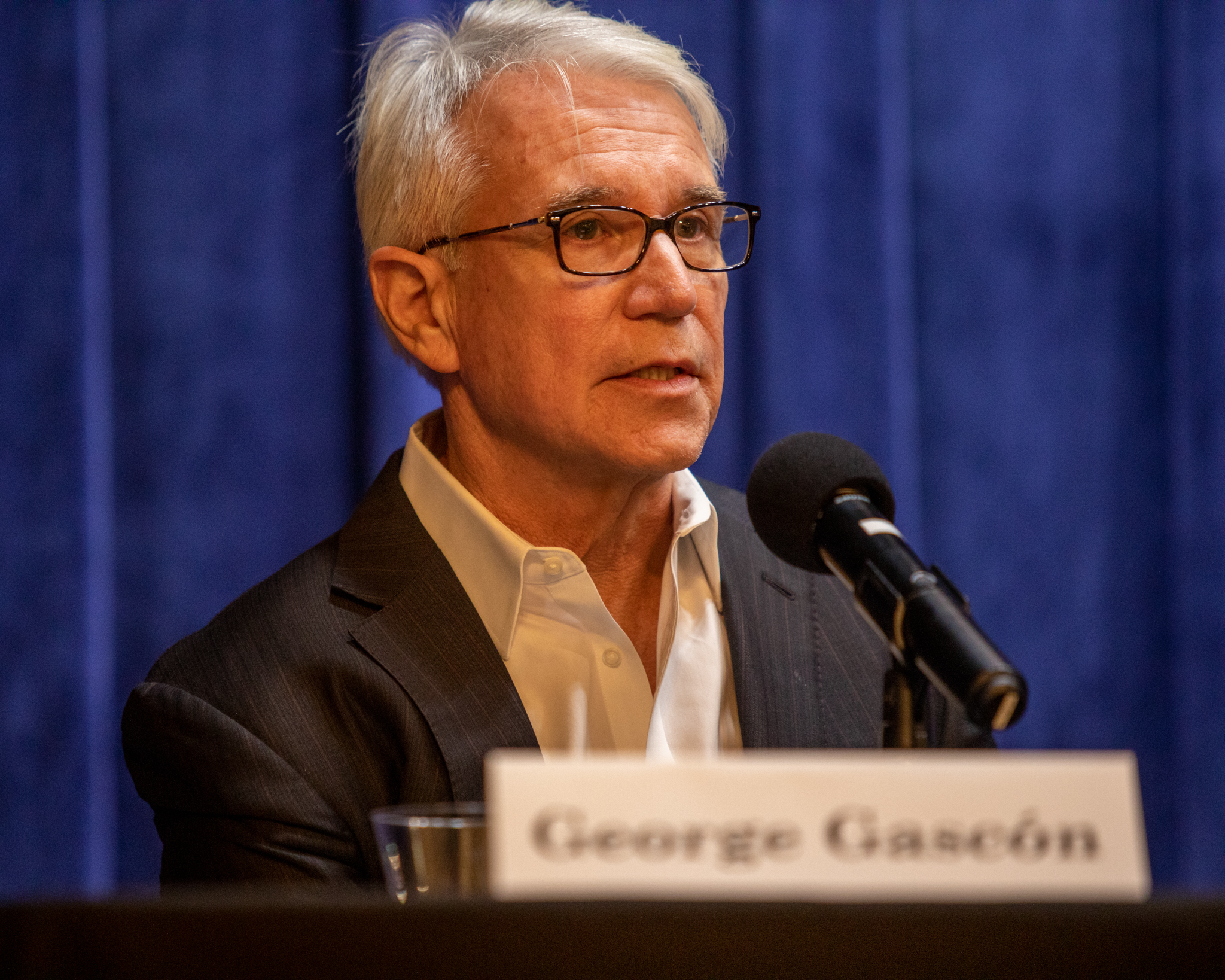

With challenger George Gascón headed to a runoff against incumbent Jackie Lacey in November in LA’s District Attorney race, the discussion is ramping up on what the DA’s office needs to do to save lives during the COVID-19 discussion. But, while George Gascón participated in the LA Justice Coalition Event, as Jackie Lacey did prior to the primary, she declined to participate.
George Gascón stepped down as DA in San Francisco last fall and is now facing the LA incumbent in a November runoff.
He is running as a reform candidate, and on Tuesday proclaimed that the reset button has been pushed. “We cannot go back,” he said. “We can reduce incarceration and we can increase safety by doing so.”
He sees opportunities in the current system and “we have to ensure that they’re not wasted.”
Gascón criticized Lacey for having a disregard not only for the safety of people incarcerated, “but frankly for everybody’s safety.”
He said, “She is putting everybody at risk by putting people through a system that is likely to cause more harm than it is to cause good.”
In the current jail, he said, “55% of the people who remain in our county jail, even by the most conservative definition, are people who are not dangerous.”
Gascon also criticized the current DA for the work-arounds that they have created to make sure people are not released under zero bail policies.
He explained that they saw emails where DAs were told “to have law enforcement seek an arrest warrant because an arrest warrant was a way for them to stick to the bail schedule.”
As others mentioned, they have seen them encourage their DAs to charge people with looting—“which is very disingenuous” and also “not what the average person thinks of as looting.”
He even said people who are shoplifting could be charged with looting to bypass the zero bail.
Overall, the idea that the community will be less safe based on releases “is really contrary to the evidence.”
He said, “Crime has not gone up.” He added, “We need to make sure that we do not go back to where we were.”
Nikhil Ramnaney, a Deputy Public Defender with the LA County Public Defender’s Office, and the president of the LA County Public Defender Union, at an LA Justice Coalition Event noted that, despite claims to the contrary, “We have seen a continued failure of leadership from the current DA.
“What the DA is currently doing is continuing non-evidence based tropes and clichés,” he said, alluding to arguments that clients are safer in custody than they would be on the street. “Forty-seven hundred plus people are in quarantine right now. That’s more than a third of the LA County jail population.”
He said they are still having the debate over the zero dollar bail and, therefore, “we haven’t even started the conversation about the people who are not these lower levels ones that didn’t make the list.”
He noted creative legal strategies “to circumvent zero dollar bail through charging decisions.” One of the newer practices is to charge people with looting “as a way to circumvent low level theft charges (which) qualify for zero dollar bail.
“There’s a way to technically charge anybody for looting even if it’s an offense that has no nexus to what we traditionally think as looting,” he said.
Robin Steinberg, a former public defender who founded the Bail Project, pointed out that the practice of putting large numbers in jails cells “did not start with COVID-19.”
Of the 17,000 people being held in LA County jails, about 45 percent of them—7500 people, she said “were there despite the fact that they were not convicted of a crime. Most were there because they couldn’t afford to pay their shockingly high bail.”
Steinberg pointed out that California’s average bail is five times that of the national average.
There has been a lot of talk about people released on zero bail committing new crimes.
However, she disagreed with this.
She remarked that “this is exactly the kind of distraction that we see being raised in the media when somebody gets bail and then something bad happens—no one talks about the 9000 people who got released who went home to their families and their families were able to thrive and they went back to their jobs and did better.”
Earlier she pointed out, “Don’t get distracted by the cherry-picking of the bad cases—the person arrested three times in one day under the zero bail policy type stories. These are exceptions and they obscure the larger story of the  human costs of jailing people because they can’t pay bail—and they obscure the successes of the overwhelming majority of the people who return to their families and their communities, have better life and better case outcomes when they’re out.”
human costs of jailing people because they can’t pay bail—and they obscure the successes of the overwhelming majority of the people who return to their families and their communities, have better life and better case outcomes when they’re out.”
Greg Akili from Black Lives Matter, Los Angeles, criticized the prosecution system as having “no oversight, accountability or transparency,” saying prosecutors traditionally have “focused on achieving punishment at any and all costs.
“That’s how they measure their success,” he said. “That has created the misplaced assumption that punishment equates to public safety.”
In his view, this drives incarceration rates and, in this current crisis, the DA’s office should be doing more. The report from inside the system was one of frustration.
Maria Casillas, formerly incarcerated and with many family members currently in the system, complained about the lack of support and protection for people in the system.
“There’s not enough help, there’s no support,” she said. Her loved one suffering from diabetes and asthma has had to be put into quarantine himself after authorities refused to move three infected people from around him. “There was no one listening to him, following protocol, or giving him any protection.”
Dr. Shamsher Samra, a doctor who works in the system, said that “the baseline conditions in the jail are poor, but it’s only been made worse in the setting of the pandemic.”
He described a man who came into custody with symptoms consistent with COVID. They didn’t test him—instead they put him into quarantine.
“The first thing that came to my mind is what does it mean to self-isolate or quarantine in a custody setting?” he said. “In jail that means that you may have reduced recreational time. Or conditions that are more along the lines of solitary.”
He said, “Care in the custody setting is not equivalent to care that exists in the community.”
But, because of his symptoms, that man did not qualify for isolation. So he was sent to the general population even though he was coughing and had a lot of symptoms consistent with COVID.
“The standards of care, rather than being higher for individuals in this situation, were lowered to accommodate the inability to get people out of the jails quickly enough,” he said.
Diana Zuniga worked on the Alternatives to Incarceration Work Group for the last year. Through their work, they focused in on three values —racial equity and justice, inclusion of many voices, and human-centered language. They developed 114 recommendations to reduce incarceration.
She said that, following the COVID outbreak, there was a reduction of the number of people in the jails, but “there was also a reduction of the number of resources for people coming out of the jails.”
Zuniga complained that the recommendations from the group are “being implemented in a very… not so coordinated way.” One area where they are being implemented is in connecting to some housing.
—David M. Greenwald reporting
To sign up for our new newsletter – Everyday Injustice – https://tinyurl.com/yyultcf9

